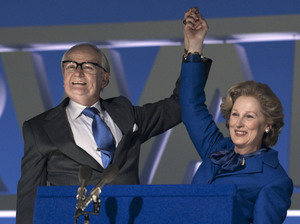 |
| Outside the Central Market in Battambang this morning |
 |
Images by Atsushi Furusawa |
 |
| Journalist Elizabet Becker beside a photo she took of Pol Pot in December 1979, a few days before the Vietnamese invasion |

|
This week:
Thursday
16 Feb |
The Descendants
|
SUMMARY*
This
sweet, sad new film from Alexander
Payne holds a promise of gentleness that is
fulfilled, and a promise of complexity that isn't.
Starring George
Clooney as a wealthy Hawaiian lawyer whose wife is
in a coma, The
Descendants has a kind of surface difficulty, but
is distinctly soft-centred, lenient and sentimental
compared to the three scabrous and brilliant pictures
that have cemented Payne's reputation over the last
decade.
|
Production year:
2011
· Country: USA
· Cert (UK):
15
· Runtime: 115
mins
· Directors:
Alexander Payne
· Cast:
Amara Miller, Beau Bridges, George Clooney, Judy Greer,
Matthew Lillard, Michael Ontkean, Nick Krause, Robert
Forster, Shailene Woodley
|
|
Advance Notice:
Thursday 23 February
|
The
Iron Lady
|
SUMMARY*
Poor Margaret
Thatcher: her transformation into biopic drag
queen is now complete. Daringly, screenwriter Abi Morgan
and director Phyllida Lloyd have made a movie
about Baroness Thatcher's flashback-riddled dementia
while their subject is still alive. Britain's most
important and controversial postwar prime minister has
been recast – rather like Judi Dench's Iris Murdoch 10
years ago – into a bewildered old lady cherished
in dramatic terms for her poignant vulnerability and
decline, rather than for the mature achievements
of her pomp.
|
·
Production year: 2011
· Country: UK
· Cert (UK):
12A
· Runtime: 104
mins
· Directors:
Phyllida Lloyd
· Cast:
Alexandra Roach, Anthony Head, Harry Lloyd, Jim
Broadbent, Meryl Streep, Olivia Coleman, Olivia Colman,
Richard E Grant, Roger Allam
|
 |
| Victims wait at Battambang police station |
 |
| Above: many foreigners get short term visas to pick fruit in Australia but it is highly unusual for Cambodian Citizens to be given this type of visa |